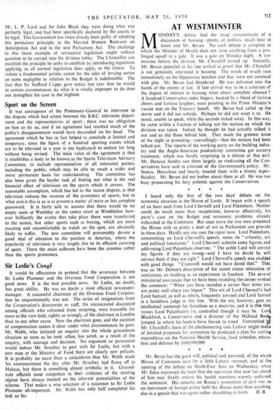Legislating Backwards
Lord Winster has made an effective contribution to the controversy on retroactive legislation by recalling that the Declaration of Human Rights, which the General Assembly of the United Nations, with the full concurrence of the British Government, has adopted, lays it down that " no one shall be held guilty of any penal offence on account of any act or omission which did not constitute a penal offence under national or international law, when the offence was committed." This, of course, is plain justice, and the spirit of it applies squarely to the cases in respect of which Sir Stafford Cripps is introducing retrospective legislation. It may or may not be socially a good thing that shareholders should pay a director a large sum in order to retain his services indefinitely. If it is a bad thing, then let legislation be introduced to prohibit such transactions in the future. But when the Austin and Standard shareholders voted money to Mr. L. P. Lord and Sir John Black they were doing what was perfectly legal, and had been specifically declared by the courts to be legal. This Government has twice already been guilty of adopting this pernicious principle; in the Married Women Restraint on Anticipation Act and in the new Parliament Act. The challenge to this latest example of retroactive legislation ought without question to be carried into the division lobby. The Chancellor can establish the principle he seeks to establish by introducing legislation applying, as all normal legislation does apply, to the future. To violate a fundamental juristic canon for the sake of levying surtax on sums negligible in relation to the Budget is indefensible. The fact that Sir Stafford Cripps gave notice last year that he would in certain circumstances do what it is wholly improper to do does not strengthen his case in the'slightest.







































 Previous page
Previous page